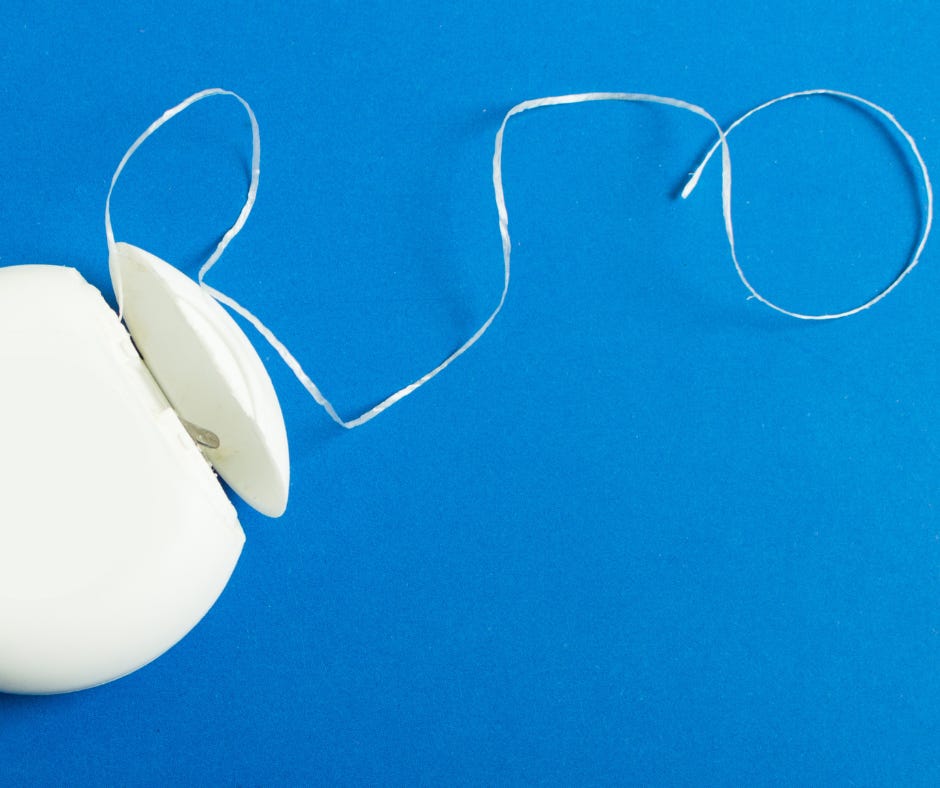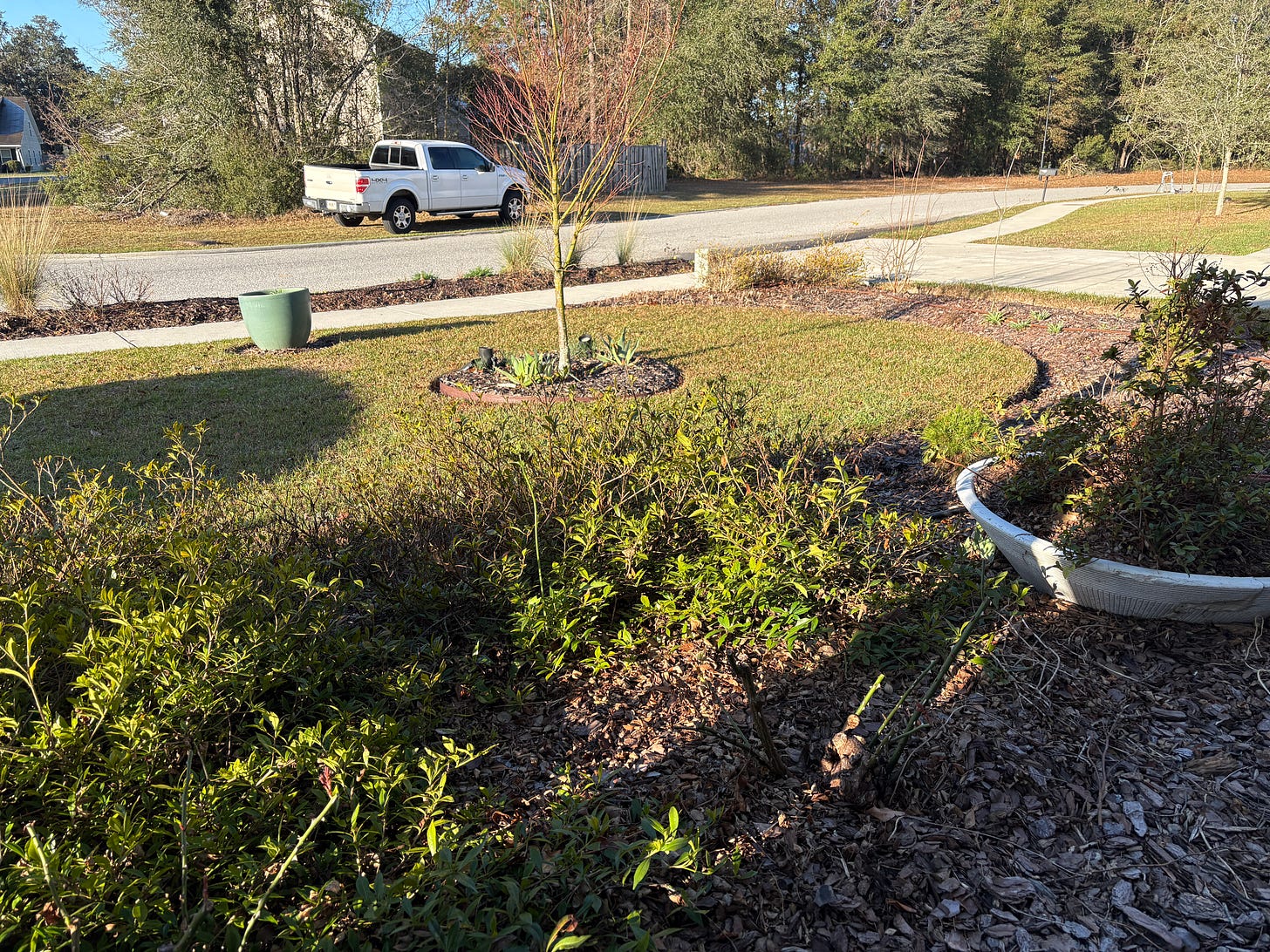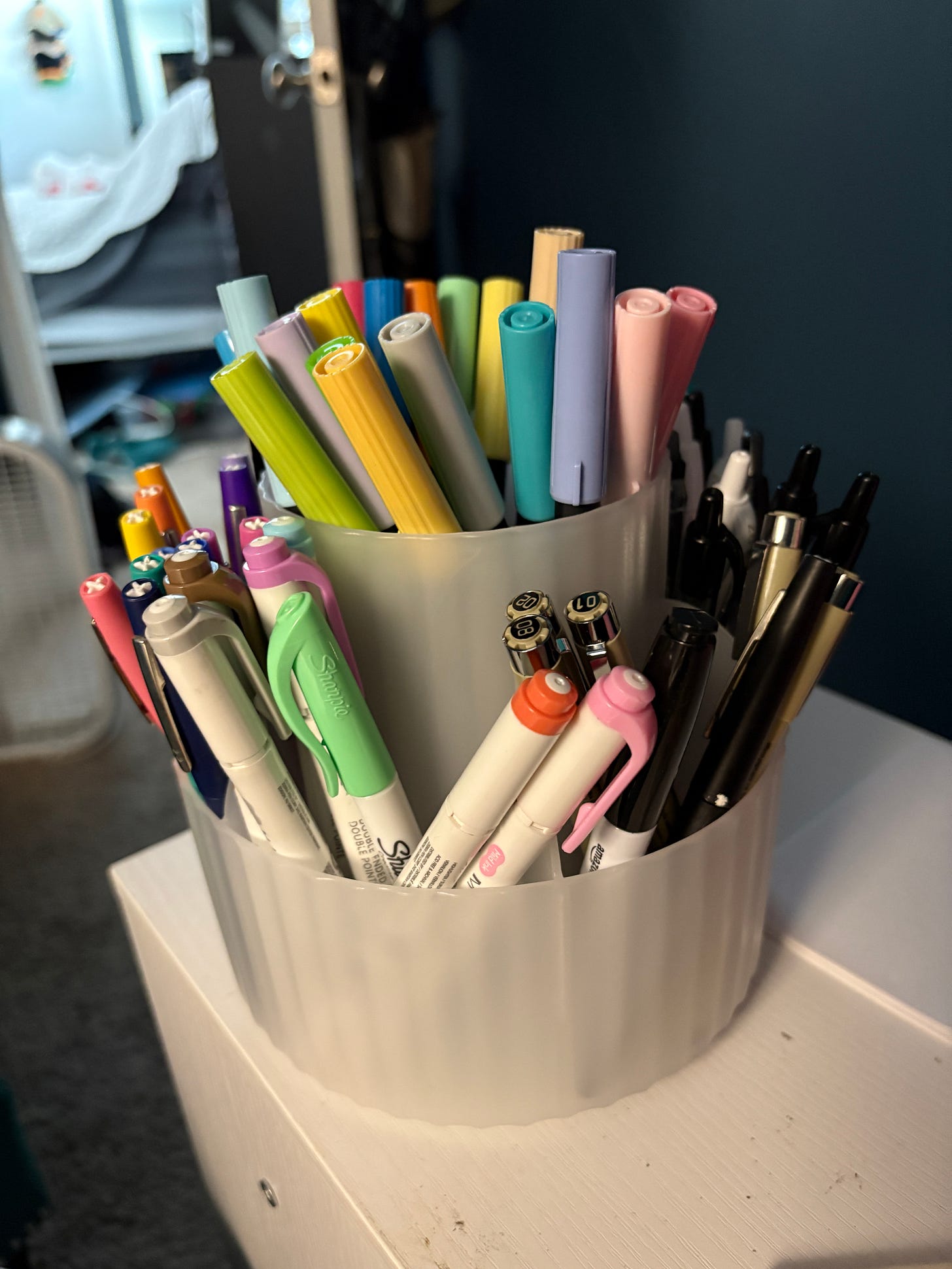Chelsey's Depression Toolkit
Things that help even though I don’t want to do them
I have a vivid memory of sitting at the desk in my bedroom. The walls were painted purple and there was a floral wallpaper border around the top of the walls. I was 15 or 16 years old. My Bible was open on the desk before me, and I wept as I read Psalm 25 over and over again.
I don’t remember why I felt so much despair. I remember the psalm brought me comfort. I remember finding myself in that same spot again, and again, and again.
After I started going to counseling in 2015, I realized that it was possible that my experience in high school had a name: depression. What opened my eyes fully was this Youtube video:
The very first time I watched that video, I recognized that black dog immediately.
That was almost 10 years ago, and since then, the black dog is still present in my life. I’m not always fully aware of him, but I know he can appear at any time. Sometimes, I can sense his impending arrival. It is a black dog that is also a black cloud on the horizon, looming large in the distance, but I am on a conveyor belt and I cannot stop from finding myself underneath it. (Sorry to mix metaphors.)
What is different now compared to high school, or even 2015, is that I have slowly acquired a set of tools that I pull out when the black dog shows up. Many of these things are just good things to do all the time. But they are the first habits I lose when depression hits. And so, as I trudge along waiting for the depression to lift, I work toward doing these things again.
Before we get to the toolkit, let me quickly say a word about accessing the toolkit. For me, medication was the key that allowed me to unlock the toolkit. That isn’t necessary for everyone. But if trying even one of these things feels too hard, I’d encourage you to see a doctor or psychiatrist. That said, recent studies have shown that scientists and doctors don’t really know how or why antidepressants work1. There is evidence that they do work for some people, but there is no guarantee. So whether you decide to take medicine or not, these things are worth trying.
I do not make a checklist or a habit tracker for these things. That is not the vibe. Instead, I look at it as more of a list of options—what can I do right now that will help me feel just a little bit better?
Let me also say that I am not writing this to you from an ivory tower of having conquered depression. As I get ready for this to go up on a Monday morning, I am mentally deciding which of these things I should attempt to do tomorrow, because I am batting about 0.100 on these right now. I’m in the pit, too, but I’m going to keep taking the next step forward.
chelsey’s depression toolkit
Drink 0.5-1 gallon of water a day
Dehydration is the worst because it doesn’t feel like dehydration. You just feel crummy. It’s true that you might feel crummy even if you do drink a gallon of water, but at least it won’t be because you’re not well hydrated.
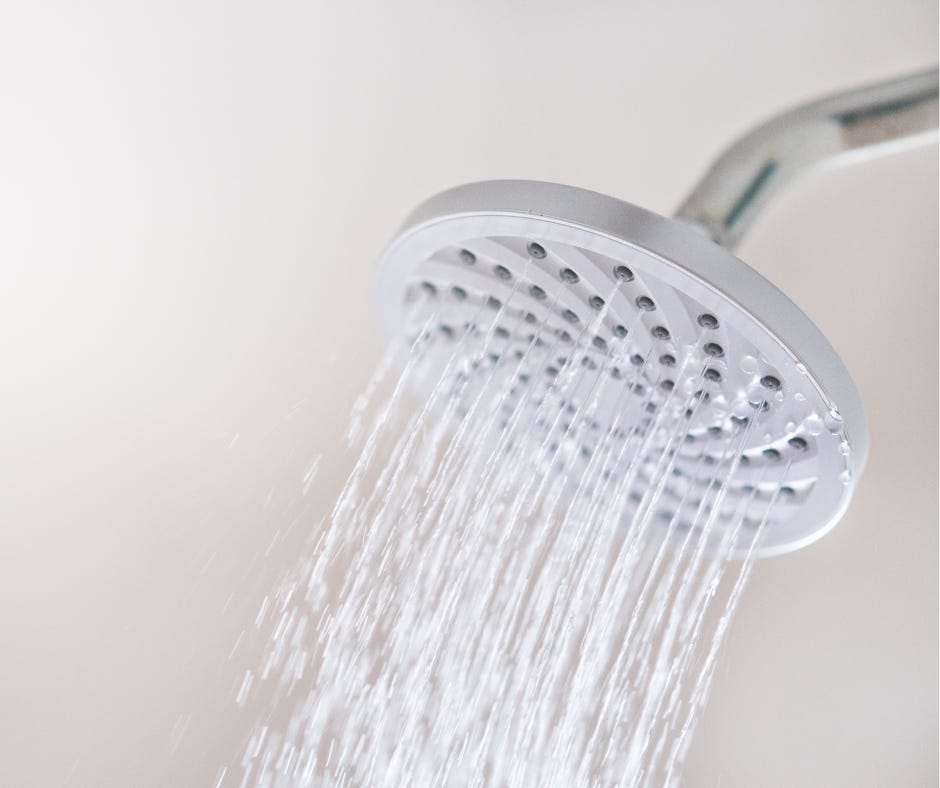
Take a shower
Something that keeps me stuck in the depression funk is fixating on how gross I feel. I hate how my body looks, I hate my face, I hate what my hair is doing. And yet I also often stop showering. This is self sabotage at its finest. Forcing myself to take a shower every day is my way of reminding myself that I’m worth taking care of. (Also, the people in my house probably appreciate it.)
Wash your water bottle
Speaking of drinking water and washing things, I underestimated the power of washing my water bottle. I couldn’t possibly guess how infrequently I wash it—from what I see online I’m not alone. But when you are depressed you have to accept little tidbits of joy, and washing my water bottle and then drinking cold water out of it really made my day recently.
Perform a personal hygiene task
This is going to sound crazy, but the way I know my depression is lifting is when I find the ability to floss my teeth again. But Chelsey, you might be saying, flossing is not difficult and only takes a couple minutes. I am well aware of this, but when I am depressed, flossing my teeth feels equivalent to running a marathon. I cannot do it. But if I really push myself to just floss at bedtime, I feel better already. The sense of accomplishment is disproportionate to the task, but somehow it helps.
Eat three meals a day…
Last fall, a family situation led me to stop eating for several days. I had no appetite. I didn’t want to eat. And I felt truly horrible. I was reminded that our bodies need fuel just to function at a baseline level, even if we’re not very active or doing much. Our brains also need fuel in order to function, and a brain that functions is key to actually using the tools on this list.
…that include protein and a healthy fat
But not just eating! Try to eat some protein. Add in a healthy fat like a spoonful of peanut butter. You don’t have to batch prep salads. Just buy some big packages of frozen meatballs or sausages from Costco and heat them up in the microwave.
Sit in the sunshine
I have an amazing little room that I call the Dopamine Den. It makes me so happy to sit in there. It has all of my stuff, a comfy chair, my quilt, all my pens and markers, all the stuff for my hobbies, and tons of books. But there are no windows. On very dark days I have to at least drag myself to our bed and open the blinds all the way so the sun gets in. If I’m really motivated, I will go sit on the front porch in the afternoon and let my body try to make some vitamin D naturally. Seasonal affective disorder is real, but don’t give it to yourself by sitting in the dark all the time.
Move
Do a short ab workout. Go for a walk. Do 15 push-ups. Anything to remind you that you have a body.
Tidy one space
I know, I know—I’ve gone too far. But our brains don’t like clutter. After a while we get habituated to it in our conscious minds but I believe subconsciously it’s still bothering us. One of my favorite minimalists calls it “The Silent To Do List” and explains how everything in your home is talking to you. Sometimes it’s saying kind things. Sometimes it’s screaming at you to clean it. Silencing even one little area can make a different. And sometimes it causes a ripple effect and you do even more than you planned.
Declutter
Along with tidying up a space, decluttering something—anything—can be a huge boost to your mental health. Maybe it’s a box in your closet, or a drawer in your kitchen. You don’t have to do an entire room. Just one little spot. Like tidying a space, decluttering a space sometimes gets some momentum going for other things.
Find anything else to focus on
I’m not telling you to deny your feelings or languish in escapism. In his book Breaking the Patterns of Depression, Dr. Michael Yapko highlights how focusing on your depression can actually worsen your depressive feelings. Sitting around and thinking about how depressed you are is not going to solve it. Find a new hobby, read a book, binge watch a funny show. Anything to take your mind off how terrible you feel. For me, it’s usually cross stitching with a good audiobook in my ear.
Tell one person
Another favorite act of self sabotage for me is shutting every single person I know out when I am in a major depressive episode. I go dark. I ghost people. Sometimes I don’t go quite that far, but I just act like everything is totally fine and then feel inwardly resentful that no one realizes I’m having a hard time. In case you’re wondering, neither of these is helpful. Just tell one person. Against my broken brain’s advice, I told two close friends last week that I was really struggling. I told them I was reading their texts and listening and praying but that I didn’t feel able to respond and wanted them to know I wasn’t upset. They responded in the best possible way and I actually felt better able to engage and connect because I knew that they loved me and they weren’t expecting anything of me other than just to start feeling better.
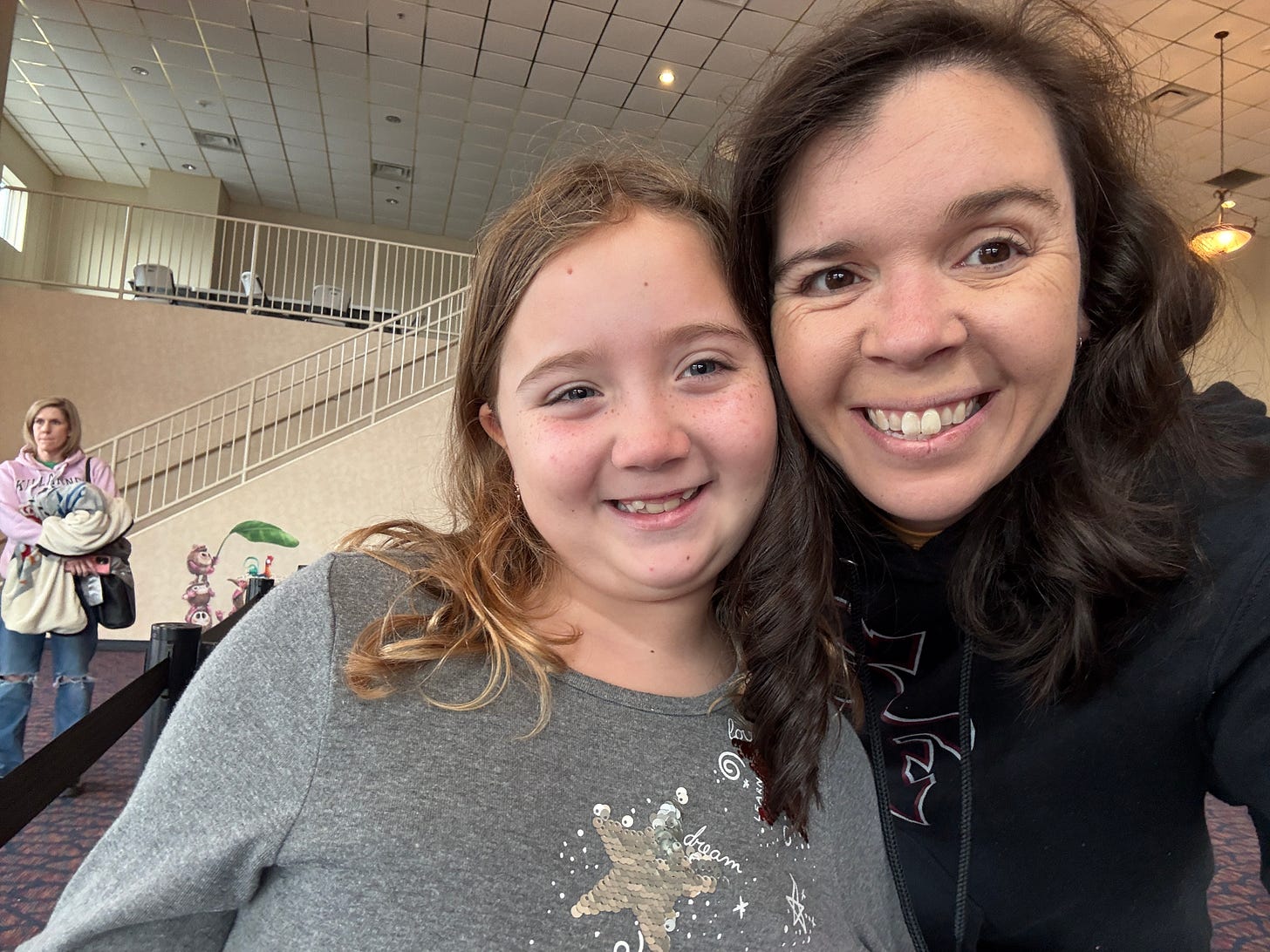
Remember that not everyone feels bad
There’s the old saying, “If mama ain’t happy, ain’t nobody happy.” It’s hard to dispute this and there’s only so much you can do. But my temptation when I am feeling depressed is to drag everybody in my house down with me. The problem is, they are not also depressed. They are doing just fine. And so not only do they not want to live in the pit with me, but they don’t understand why I’m placing new and unprecedented demands on them. The truth is, I want to put demands on myself, but I don’t feel able to fulfill them, so I just throw those demands on the people in my house. It isn’t fair to them, and it isn’t helpful, either. It’s OK if you can’t do all the things you normally do. Just don’t get angry at other people about it.
Find something to look forward to
At some point in the spring of 2020, Christian was keeping up with the news and saw advice about how to trudge through those lonely, isolating days of the early pandemic. It suggested putting something on the calendar to look forward to. A study from 19972 explains why this works—it found that more dopamine is triggered in the anticipation of an event compared to the event itself. I can’t remember what I put on my calendar then, because there wasn’t much going on, but this advice still stands. Right now, I have several things on my calendar that I am looking forward to: celebrating my birthday with my husband, a girls’ day with two local friends, and a girls’ weekend with two faraway friends. On a weekly basis, I have a standing date with myself at my favorite coffee shop on Fridays. As the week goes on, I get more and more excited about this.
Many of you know that I am a Christian. I believe the Bible is the inspired word of God, and I believe that 2 Peter 1:3 is true: “His divine power has granted to us all things that pertain to life and godliness, through the knowledge of him who called us to his own glory and excellence…” The Bible doesn’t say anything about decluttering when you’re depressed. But we are whole people, and depression doesn’t just affect your mind or your body—it is a disorder of the heart and soul as well. I haven’t addressed that here, mostly because that’s its own post. So please don’t read this and hear me saying that neither Jesus nor the Bible have anything to say about depression. That couldn’t be farther from the truth, and I plan to write about that soon.
My goal here is to normalize the experience of depression. Few of us choose when the black dog descends on us. All we can do is keep taking steps forward.
Next week, I’ll be sharing a working list of resources I’ve found helpful in my struggle with depression. That post will continue to be updated as I find new resources. If you’re not already subscribed, please do so that you don’t miss it!


